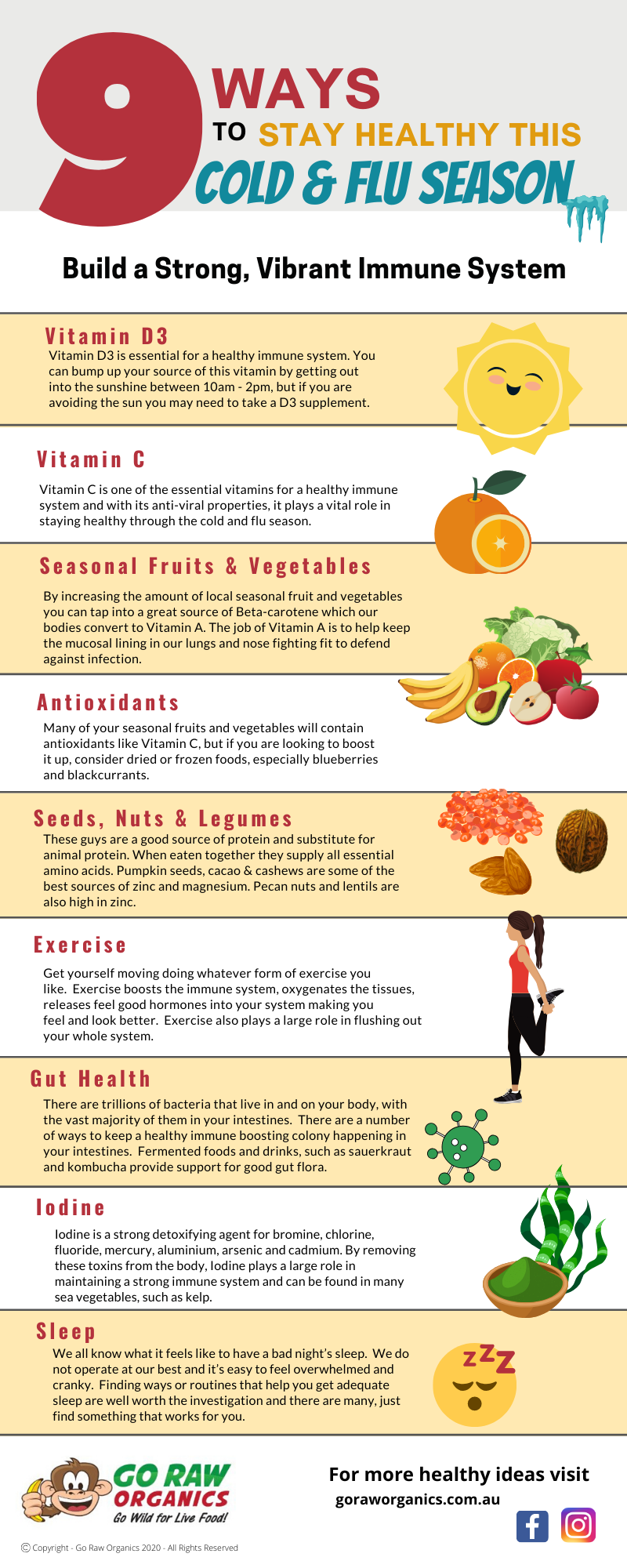The best form of defence is offence, whether it’s on the sports field or more personally in your own body. As the Cold and Flu Season approaches, we would like to share with you some of the tried and tested methods and lifestyle choices that can be made to support a vibrant, robust immune system.
Vitamin D3
Vitamin D3 is essential for a healthy immune system. You can bump up your source of this vitamin by getting out into the sunshine and taking D3 supplements. If taking Vitamin D3 as a supplement or getting plenty of sunshine, which enhances calcium absorption, it is also essential to take Vitamin K2. This Vitamin helps absorb calcium into the bones and teeth while removing it from the arteries, joints and soft tissues. Vitamin A (retinol) is also essential when taking vitamin D3 and K2 as they all work together synergistically. Great sources of Vitamin A are fruit, vegetables, fish, eggs. If vegan, a vitamin A supplement may be needed to obtain the more highly evolved form (retinol). To make sure that you are receiving enough D3, K2 and A vitamins there are supplements that combine all three.
Vitamin C
Vitamin C is one of the essential vitamins for a healthy immune system and with its anti-viral properties, it plays a vital role in staying healthy through the cold and flu season. Vitamin C rich foods include kiwi fruit, citrus fruit and capsicums. Vitamin C can also be taken as a supplement.
Seasonal Fruit & Vegetable
By increasing the amount of local seasonal fruit and vegetables you can tap into a great source of Beta-carotene which our bodies convert to Vitamin A. The job of Vitamin A is to help keep the mucosal lining in our lungs and nose fighting fit to defend against infection. Below are several Fruits and Vegetable that are in season in Australia over Autumn and Winter – these may vary dependant on the local environment.
Autumn Fruits Apple, Avocado, Banana, Kiwifruit, Lemon, Lime, Mandarin, Papaya, Passionfruit, Pear, Persimmon, Plum, Pomegranate, Rockmelon, Orange, Strawberry, Tomato
Autumn Vegetables Asian greens, Beetroot, Broccoli / Broccolini, Cabbage, Capsicum, Carrot, Cauliflower, Celery, Eggplant, Green beans, Leek, Lettuce, Mushroom, Onion, Parsnip, Peas, Potato, Pumpkin, Radishes, Rhubarb, Spinach, Squash, Swede, Sweet Potato, Sweet Corn, Turnip, Zucchini
Winter Fruits Apple, Avocado, Banana, Grapefruit, Guava, Kiwifruit, Lemon, Lime, Mandarin, Orange, Pineapple, Passionfruit, Quince, Tangelo, Strawberry
Winter Vegetables Asian Greens, Beetroot, Broccoli / Broccolini, Brussels sprouts, Cabbage, Carrot, Cauliflower, Celeriac, Celery, Eggplant, Fennel, Kale, Lettuce, Mushroom, Parsnip, Peas, Potato, Rhubarb, Truffles, Turnip
Seasonal Food Guide – Perth Melbourne Brisbane Sydney Adelaide Tasmania
Antioxidants
Many of your seasonal fruits and vegetables will contain antioxidants like Vitamin C. But if you are looking to boost it up, consider dried or frozen foods like;
- Cranberries
- Blueberries
- Macadamia Nuts
- Dark Chocolate or Cacao
- Spices like bay leaf, clove, nutmeg, basil and cinnamon contain an antioxidant call eugenol, which helps protect the body from inflammation – added bonus – they can take a dish from blah to Kapow.
Seeds, Nuts and Legumes
These guys are a good source of protein and substitute for animal protein. When eaten together they supply all essential amino acids. Many people balance seeds and nuts high in pro-inflammatory omega 6 with anti-inflammatory high omega 3 sources such as linseed or hemp seeds. Walnuts are like the super nut of Omega 3 levels, having the highest omega 3 content of any nut. Vegans may need an omega 3 supplement to get the more highly evolved forms of omega 3 (EPA & DHA). Vegan omega 3 from algae is available as a substitute for fish oils.
Pumpkin seeds, cacao & cashews are some of the best sources of zinc and magnesium. Pecans and lentils are also high in zinc. Magnesium is not stored in the body and requires daily intakes from food or supplements for the body to operate at optimum.
Exercise
Get yourself moving doing whatever form of exercise you like. Exercise boosts the immune system, oxygenates the tissues, releases feel good hormones into your system making you feel and look better. Exercise also plays a large role in flushing out your whole system.
Gut Health
There are trillions of bacteria that live in and on your body, with the vast majority of them in your intestines. They are sometimes called microbiota or gut flora. There are several ways to keep a healthy immune-boosting colony happening in your intestines.
- Eating vegetables, legumes, beans and fruit will assist in providing the best nutrient for healthy gut flora.
- Eating fermented foods, like Kombucha, Kefir, Sauerkraut, Kimchi, Tempeh or Yoghurt
- Avoid artificial Sweeteners. Try organic sweeteners, which are just as nice without the negative effect on blood sugar levels.
- Eat more prebiotic foods like;
- Legumes, beans and peas
- Oats
- Bananas
- Berries
- Jerusalem artichokes
- Asparagus
- Dandelion greens
- Garlic
- Leeks
- Onions
Prebiotics are types of fibre that humans cannot digest, but your gut bacteria can. These types of fibre provide nutrients to the bacteria that support healthy digestion and immune function.
- Take a probiotic supplement.
Iodine
Iodine is a strong detoxifying agent for bromine, chlorine, fluoride, mercury, aluminium, arsenic and cadmium. By removing these toxins from the body, Iodine plays a large role in maintaining a strong immune system. Iodide combines in the body with Hydrogen Peroxide to form elemental iodine, which has broad-spectrum anti-bacterial, anti-viral, anti-septic and anti-cancer functionality in the lymph nodes. Most brown seaweeds such as Kelp are high in iodine and contain many bio-available vitamins and minerals our bodies require.
Sleep
Ahhhh…. and finally, to sleep. We all know what it feels like to have a bad night’s sleep. We do not operate at our best and it is easy to feel overwhelmed and cranky. Finding ways or routines that help you get adequate sleep are well worth the investigation and there are many, just find something that works for you. Adequate sleep is essential for good health and feeling good about taking on the rigours of life. Make sure you get exposure to sunlight which helps the body produce melatonin which in turn helps us sleep well. Sunlight helps set the “body clock” which influences our sleep cycle.
Prime your immune system to attack whatever comes along!



